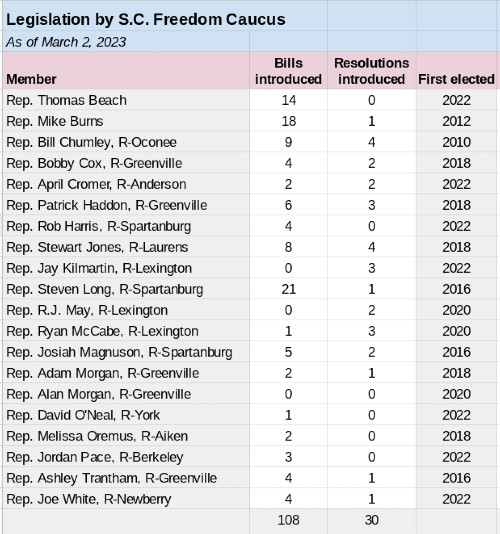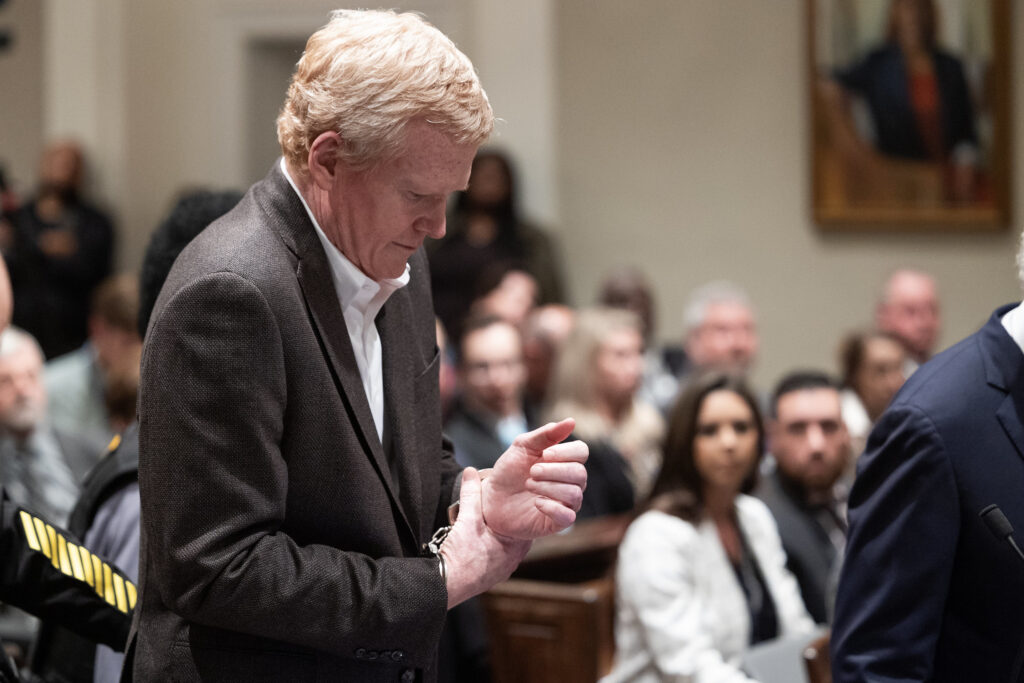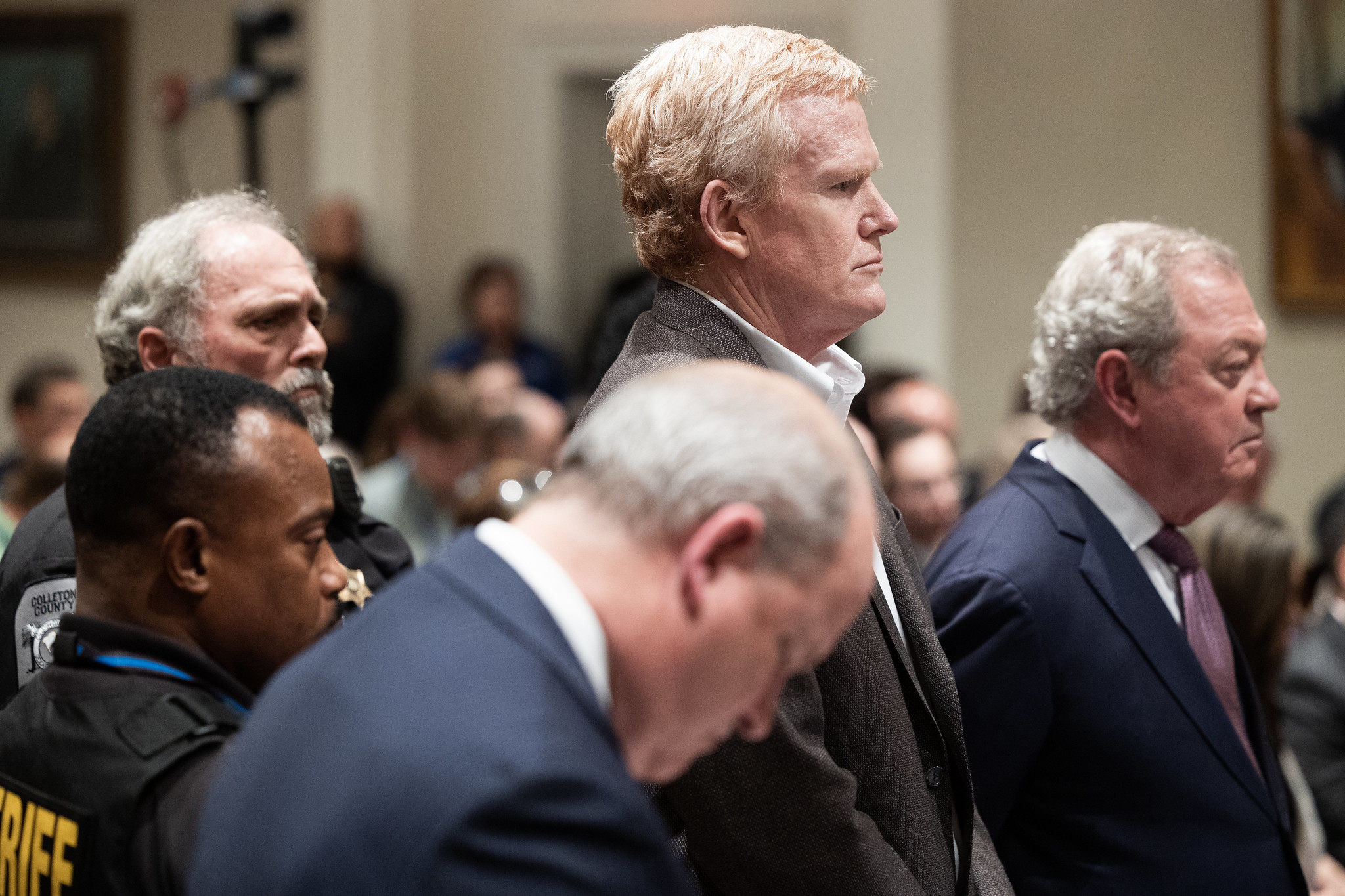STATEHOUSE REPORT | ISSUE 22.09 | March 3, 2023
NEWS: S.C. Freedom Caucus squawks, but doesn’t do much
NEWS BRIEFS: Murdaugh sentenced to life in prison for double murders
LOWCOUNTRY, Ariail: Useful idiots
COMMENTARY, Brack: What we should learn from the Murdaugh trial
SPOTLIGHT: S.C. Hospital Association
FEEDBACK:Must have read column
MYSTERY PHOTO: Easy peasy
All hat, no cattle:
S.C. Freedom Caucus squawks, but doesn’t do much

A news analysis
By Andy Brack, editor and publisher | One of the biggest flamethrowers with the uber-conservative S.C. Freedom Caucus has introduced legislation to make sure people appointed to represent church-operated childcare centers are from “registered faith-based centers.” The bill (H. 3745) by GOP S.C. Rep. Adam Morgan is stuck in a committee.


His fiery colleague, Rep. R.J. May, R-Lexington, has introduced no bills, but has entered two resolutions in the S.C. House – one recognizing the S.C. Moms for Liberty and the other recognizing a mother of the year.

They and 18 other House members elected as Republicans are members of the splinter Freedom Caucus, which wants the already conservative Republican Party to be more conservative.
“These guys are a headache,” said S.C. Rep. Micah Caskey, a Lexington County Republican frustrated by fissures caused by the Freedom Caucus. “In many ways, they’re an obstacle in enacting conservative legislation.”
More than anything, many observers say they seem to be more interested in making headlines, as some old-time politicians would say, than headway. In the last week, they’ve been complaining about not being able to raise money as a caucus. So they filed a lawsuit. They’ve also filed lawsuits against school districts.
A thin legislative record
So far this session, the 20 members of the caucus have introduced 108 bills and 30 resolutions. Of that number, three of the 20 have introduced half of the bills, meaning the rest of them each have introduced an average of just three bills. One member – Rep. Alan Morgan is a Republican from Greenville who is brother to Adam (mentioned above) – has introduced zero bills or resolutions.
 An analysis of bills introduced by the Freedom Caucus members shows some of them have introduced measures backed through the years by mainstream Republicans. Examples: Constitutional carry of guns, changes to the ways judges are picked, term limits, closed primaries, tough abortion proposals and all manner of tax reforms or tax exemptions.
An analysis of bills introduced by the Freedom Caucus members shows some of them have introduced measures backed through the years by mainstream Republicans. Examples: Constitutional carry of guns, changes to the ways judges are picked, term limits, closed primaries, tough abortion proposals and all manner of tax reforms or tax exemptions.
But members of the Freedom Caucus also have introduced legislation many would consider a little “out there,” such as a proposal to keep local governments from limiting what food you can grow, stopping drag shows in private businesses, mandating that parents have the ultimate responsibility to bring up their kids, changing marriage licenses, using paper ballots for voting, keeping anybody from China from owning more than 100 acres of land and a prohibition on changing a birth gender on a birth certificate. They’re also vocal about the hot-button issue of critical race theory being used to inform teaching in public schools – when it’s not used at all in South Carolina.
In the Statehouse, the way to get things done is to introduce bills – or legislative proposals – that colleagues can vote for or against. Resolutions are generally House-passed sentiments to memorialize or congratulate South Carolinians.
“They don’t have the numbers to change the votes,” said Caskey, referring to the traditional Republican Caucus, which has a majority of the votes in the S.C. House. “We’ve got enough real Republicans to pass what we want. They’re not driving anything, not affecting anything, other than being a headache on social media.”
The Freedom Caucus often claims it is pushing the legislative agenda to the right, which Caskey questioned considering the chamber approved a constitutional carry gun bill before the caucus existed and it has been pushing tough abortion legislation for years.
“This is just about self-promotion for the sake of their own egos,” Caskey said. “If they were genuinely interested in passing legislation, they would work with their colleagues, not against us.”
- Have a comment? Send to feedback@statehousereport.com
Murdaugh sentenced to life in prison for double murders

Staff reports | Convicted murder and former lawyer Alex Murdaugh was sentenced March 3 to life in prison without the possibility of parole for murdering his wife and younger son in June 2021.
Jurors on March 2 found Murdaugh guilty of murdering his wife, Maggie, and son, Paul. His six-week trial in rural Colleton County has gripped the nation.
In the Colleton County Courthouse today, S.C. Circuit Court Judge Clifton Newman gave Murdaugh a chance to speak before sentencing him to two consecutive life sentences.
“As I tell you again, I respect this court,” Murdaugh said, according to the Associated Press. “But I am innocent. I would never under any circumstances hurt my wife Maggie and I would never under any circumstances hurt my son Paul-Paul,”
Newman replied, noting Murdaugh’s dependence on painkillers: “And it might not have been you. It might have been the monster you become when you take 15, 20, 30, 40, 50, 60 opioid pills. Maybe you become another person.
Verdict came in less than three hours
Jurors deliberated for less than three hours before delivering their verdict. Alex Murdaugh, 54, was found guilty of two counts of murder and two counts of possession of a weapon during the commission of a violent crime.
Following a long investigation stemming from the June 2021 shootings, prosecutors argued Alex Murdaugh killed his family to gain sympathy and buy time to cover up the theft from clients of millions of dollars over years that was on the verge of being discovered. They also said that after the murders, he staged an attempt on his own life to secure a multimillion dollar life insurance payout for his surviving son. The convicted killer still faces dozens of charges related to alleged financial wrongdoings.
During the six-week trial attended daily by more than 200 people, jurors heard from more than 75 witnesses and saw hundreds of pieces of evidence. This week, they also visited the scene of the killings, the family’s Moselle estate in Hampton and Colleton counties.
Maggie and Paul Murdaugh were found fatally shot near dog kennels at the estate. Alex Murdaugh admitted in court that he previously lied to investigators, telling them he was not at the kennels before finding their bodies. He also admitted to stealing from his clients, but strongly insisted he was innocent in the deaths of his wife and son.
In other news this week:
![]() Charleston’s IAAM sets new opening date for June 27 after delay. The International African American Museum (IAAM) is scheduled to open for visitors on June 27, five months after its January planned opening was delayed due to high humidity and temperatures inside the new building. An opening ceremony will be June 24.
Charleston’s IAAM sets new opening date for June 27 after delay. The International African American Museum (IAAM) is scheduled to open for visitors on June 27, five months after its January planned opening was delayed due to high humidity and temperatures inside the new building. An opening ceremony will be June 24.
S.C. lawmakers propose bill to make abortions punishable as homicides. South Carolina lawmakers proposed a bill to consider the punishment for women and those who enable abortions similar to homicide punishments.
S.C. lawmakers call for impeachment of comptroller general. A panel at the South Carolina State House is in the midst of investigating the $3.5 billion error by the state’s comptroller general, Richard Eckstrom. Some want him impeached..
S.C. House OKs penalties for convictions on bond. People charged with a violent crime who commit another crime while out on bond could face more prison time under additional sentences.
S.C. House approves referendum on state aid for private schools. The S.C. House moved to repeal a prohibition on funding private schools with public dollars as a Republican-backed voucher plan advances in the General Assembly.
Nearly 800 die in S.C. prisons, jails over 7 years. Some 777 prisoners in state jails and prisons died between 2015 and 2021, according to a new report by researchers at the University of South Carolina School of Law. “Of the 777 deaths statewide analyzed by researchers, 109 of the people had not been convicted of a crime but were awaiting trial,” according to a story in The State newspaper. “More than 500 of the deaths were attributed to medical reasons. Almost 90 were deaths by suicide.”
Harris touts broadband connection in S.C. Vice President Kamala Harris promoted the Biden administration’s achievements on broadband internet access during a visit to South Carolina. She supported the use of $175 million being spent to help improve high-speed internet infrastructure at historically Black colleges and institutions. Meanwhile, former Vice President Mike Pence is scheduled to visit S.C. Thursday.
S.C.’s Benjamin takes over major White House role. President Joe Biden on Monday announced the appointment of former Columbia Mayor Steve Benjamin as director of the White House Office of Engagement.
Ways to combat pollen this season. Some tips to prevent a stuffy nose, itchy eyes and remedies for pollen allergies.
Useful idiots

Wonder where cartoonist Robert Ariail stands on this issue. He often interprets things a little differently, but always has an interesting take on what’s going on. Love the cartoon? Hate it? What do you think: feedback@statehousereport.com.
What we should learn from the Murdaugh trial

By Andy Brack, editor and publisher | Despite your opinion of Thursday’s guilty verdict by a Colleton County jury in the double murder trial of disbarred lawyer Alex Murdaugh, South Carolina needs to take a hard look at some lessons that emerged.
 The trial exposed flaws of people’s perceptions of the justice system, weaknesses in investigations by law enforcement and inequities in society. It also offered lessons in how a court should work and how lies come back to haunt.
The trial exposed flaws of people’s perceptions of the justice system, weaknesses in investigations by law enforcement and inequities in society. It also offered lessons in how a court should work and how lies come back to haunt.
One of the most disturbing comments repeated throughout social media after the jury spent less than three hours to deliver a verdict after six weeks of the trial went something like this: “Guilty! My faith has been restored in the justice system!”
Let’s unpack that. Those words illustrate feelings held by many that the justice system seems unjust for many Americans, particularly the poor who don’t have the best lawyers for their defense like Alex Murdaugh did. Those words reek of disgust with privilege and disdain.
I understand those feelings. But what’s disturbing on a larger scale is the notion that people have lost faith with the court system. What, for example, would have been your reaction to a jury verdict of innocence? Would you have moaned that the system was rigged or that lawyers got Murdaugh off or that some other impropriety occurred?
Probably, but that reaction is troubling, too. This jury, unlike most television viewers who only caught snippets of the trial, listened to dozens of witnesses and saw more than 800 pieces of evidence. They didn’t hear the lawyer-only discussions that those glued to their television sets saw. They inhabited a kind of drama-free zone and used their best judgment to figure out what happened.
So consider your reaction to the verdict. And then consider what you would have thought if it had gone the other way. But either way – while you might be personally disappointed or thrilled with a decision – you’ve got to keep faith that a serious jury did the job it was supposed to, just like juries do all over the country every day. Yes, there might be problems with privilege and money, but the fundamental democratic concept of a trial by a jury of peers needs to remain sacrosanct in America. If we lose faith in the jury system, we’ve lost faith in America.
So the first lesson of the Murdaugh trial may be that the jury system works, regardless of a verdict. Other lessons we may need to keep that in mind:
The state’s investigators: It’s pretty clear the investigation done by the State Law Enforcement Division and local authorities had some big evidentiary problems – procedures that weren’t followed and tests that weren’t done. Perhaps Gov. Henry McMaster should order a comprehensive look at SLED’s investigatory competence through a broad performance review so that future investigations will inspire more confidence.
White privilege: Similarly, state lawmakers should think long and hard about how the Murdaugh family and its long leadership role in Hampton and surrounding counties was intricately tied with plantation-style white privilege. Perhaps lawmakers should do more to reduce poverty and increase opportunities in rural areas by boosting jobs, improving social services funding and making things fairer for all.
Court system: There have been a lot of people at the Statehouse complaining recently about the state’s judiciary. But when you watched how S.C. Circuit Court Clifton Newman presided with calm and order, day after day, and led a complicated trial in the international media spotlight, you can’t be anything but impressed. Maybe the way judges in South Carolina are picked can be tweaked, but moving to popular election of judges may be throwing out the baby with the bathwater.
Lying: The Murdaugh trial didn’t have a “this glove doesn’t fit” moment like that of the 1994 murder trial in which O.J. Simpson was not convicted of killing his ex-wife and friend. But this trial had pretty clear lessons on what happens when you lie over and over. The jury likely questioned Murdaugh’s admission of multiple lies about other things – but didn’t believe a serial liar would all of a sudden start telling the truth when life in prison was the option.
While the trial is over, the Murdaugh case surely isn’t. After sentencing will be appeals. Then more trials over financial allegations. And then more sensational movies. And then the books from witnesses, lawyers, jurors and more. It ain’t over ‘til it’s over.
Andy Brack is editor and publisher of Statehouse Report and the Charleston City Paper. Have a comment? Send to: feedback@statehousereport.com.
S.C. Hospital Association
 The public spiritedness of our underwriters allows us to bring Statehouse Report to you at no cost. This week’s spotlighted underwriter is the South Carolina Hospital Association, the Palmetto State’s foremost advocate on healthcare issues affecting South Carolinians. The mission of SCHA is to support its members in addressing the healthcare needs of South Carolina through advocacy, education, networking and regulatory assistance.
The public spiritedness of our underwriters allows us to bring Statehouse Report to you at no cost. This week’s spotlighted underwriter is the South Carolina Hospital Association, the Palmetto State’s foremost advocate on healthcare issues affecting South Carolinians. The mission of SCHA is to support its members in addressing the healthcare needs of South Carolina through advocacy, education, networking and regulatory assistance.
Founded in 1921, the South Carolina Hospital Association is the leadership organization and principal advocate for the state’s hospitals and health care systems. Based in Columbia, SCHA works with its members to improve access, quality and cost-effectiveness of health care for all South Carolinians. The state’s hospitals and health care systems employ more than 70,000 persons statewide. SCHA’s credo: We are stronger together than apart.
- To learn more about SCHA and its mission, go to: http://www.scha.org
He must have read it
![]() To the editor:
To the editor:
I guess Alan [S.C. Attorney General Alan Wilson] read your column [Race for governor in 2026 already underway]. He is finally taking an active role and questioning a witness now.
– Will Bradley, Las Vegas, Nevada
Send us your thoughts
We encourage you to send in your thoughts about policy and politics impacting South Carolina. We’ve gotten some letters in the last few weeks – some positive, others nasty. We print non-defamatory comments, but unless you provide your contact information – name and hometown, plus a phone number used only by us for verification – we can’t publish your thoughts.
Have a comment? Send your letters or comments to: feedback@statehousereport.com. Make sure to provide your contact details (name, hometown and phone number for verification. Letters are limited to 150 words.
Easy peasy

There are so many clues in this photo that it should be the easiest mystery ever. Take advantage of the fun contest, too. Send us your guess of what and where this is – as well as your name and hometown – to feedback@statehousereport.com.
 Last week’s photo, “Woodsy scene,” was the Poinsett Bridge at Poinsett Bridge Heritage Preserve in Travelers Rest.
Last week’s photo, “Woodsy scene,” was the Poinsett Bridge at Poinsett Bridge Heritage Preserve in Travelers Rest.
Congratulations to everyone who correctly identified it: Jay Altman and Elizabeth Jones, both of Columbia; George Graf of Palmyra, Va.; Robert Ariail of Camden; Penny Forrester of Tallahassee, Fla.; David Lupo of Mount Pleasant; Steve Willis of Lancaster; Dan Jepson of Travelers Rest; Allan Peel of San Antonio, Texas; Bill Segars of Hartsville; and Lawrence Moore of Folly Beach.
Forrester shared that she wrote this brief history and description when she was a member of Greenville County’s Historic Preservation Commission: “Constructed in 1820, the Poinsett Bridge is one of the oldest spans extant in South Carolina. Its impressive construction of wedge shaped rocks, erected without concrete, has pointed Gothic arches that are rare in the state today.
“The bridge was part of the State Road from Charleston through Columbia to North Carolina that was designed in 1817-1819 by Joel Poinsett, director of the South Carolina Board of Public Works. The bridge was named in his honor. Poinsett also served as Secretary of War, Minister to Mexico, and first president of the National Institute for the Promotion of Science, forerunner of the Smithsonian. It is believed that Robert Mills designed the bridge. Mills became State Architect and Engineer for the South Carolina Board of Public Works in 1820. A brush drawing by Mills of a bridge with Gothic arches and keystone identical to those of Poinsett Bridge lends credence to the belief that Mills designed the bridge. Listed in the National Register of Historic Places. October 22, 1970.”
>> Send us a mystery picture. If you have a photo that you believe will stump readers, send it along (but make sure to tell us what it is because it may stump us too!) Send to: feedback@statehousereport.com and mark it as a photo submission. Thanks.
- ORDER NOW: Copies are in Lowcountry-area bookstores now, but if you can’t swing by, you can order a copy online today.
- Now available as an e-book!
ABOUT STATEHOUSE REPORT
Statehouse Report, founded in 2001 as a weekly legislative forecast that informs readers about what is going to happen in South Carolina politics and policy, is provided to you at no charge every Friday.
- Editor and publisher: Andy Brack, 843.670.3996
Donate today
We’re proud to offer Statehouse Report for free. For more than a dozen years, we’ve been the go-to place for insightful independent policy and political news and views in the Palmetto State. And we love it as much as you do.
But now, we can use your help. If you’ve been thinking of contributing to Statehouse Report over the years, now would be a great time to contribute as we deal with the crisis. In advance, thank you.
Buy the book
Now you can get a copy of editor and publisher Andy Brack’s We Can Do Better, South Carolina! ($14.99) as a paperback or as a Kindle book ($7.99). . The book of essays offers incisive commentaries by editor and publisher Andy Brack on the American South, the common good, vexing problems for the Palmetto State and interesting South Carolina leaders.
More
-
- Mailing address: Send inquiries by mail to: P.O. Box 21942, Charleston, SC 29413
- Subscriptions are free: Click to subscribe.
- We hope you’ll keep receiving the great news and information from Statehouse Report, but if you need to unsubscribe, go to the bottom of the weekly email issue and follow the instructions.
- Read our sister publication: Charleston City Paper (every Wednesday in print; Every day online)
- © 2023, Statehouse Report, a publication of City Paper Publishing, LLC. All rights reserved.
















 We Can Do Better, South Carolina!
We Can Do Better, South Carolina!